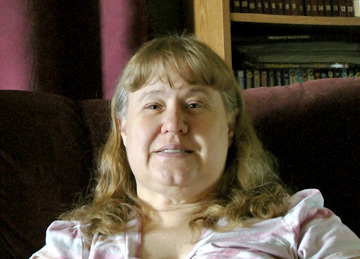Amazing Alyce

Cares for her husband
Age at interview: 47
Age at start of caregiving: 28
Alyce (47 years old) lives in a small village with her husband and their grown daughter. Alyce’s caregiving role started 13 years ago when her husband received a brain injury at work. Since then, Alyce’s husband depends a great deal on her care. Alyce provides this care despite lingering symptoms from a previous fracture in her back.
Alyce and her family used to live in the Maritimes where her husband worked for the army and studied at university. Thirteen years ago Alyce slipped on ice and had a compression fracture in her spine. A few months later Alyce’s husband was hit on his head by a piece of metal heavy enough to break his helmet and inflict his first serious head injury. He kept going back to the MRI almost daily for three weeks. The following year Alyce’s husband had two more accidents involving his head, both while working. During this difficult period, Alyce lost her mother to cancer.
Alyce’s husband was initially able to continue working after these series of injuries thanks to the care and support of his family. However, eight years ago the army let him go because of his reduced work performance, a direct result of his brain injury. Alyce is nevertheless thankful to the army, as they provided excellent support and guidance to her family during the first years of her husband’s illness. For financial reasons, she and her family moved to a much smaller village in another province two years after her husband stopped working. Initially, they enjoyed the changes and Alyce actually saw improvements in her husband’s condition. Then everything changed again when Alyce’s husband suffered a heart attack.
Alyce has noticed that her husband’s functionality improves when he visits his parental home, as if his mood and brain functions spontaneously improve in this context. At home, on the contrary, Alyce observes that her husband’s mood varies radically from day to day; he may be kind and affectionate one day and angry and frustrated the next. However, she is currently having the most difficulty with what she calls “the angriness and mental abuse directed towards the family.” She was advised to deal with it by getting out of the house and to wait until his bad mood has passed. However, this strategy is far from enough to help her situation, and her husband forgets about these attacks within a few minutes. Alyce struggles with the pain she feels from these assaults and her inability to confront him directly about it.
Alyce’s caregiving situation has negatively impacted her health; she has been hospitalised twice with caregivers’ stress and she lives with persistent back problems. She also has suicidal thoughts that she deals with by saying to herself that these are just moments she has to go through. She also reminds herself at those times that she has to go to sleep in order to wake up stronger and happier the next day. If she feels that she needs more help, Alyce writes to a good friend who always gives her specific advice on how to move forward.
Some people have advised Alyce to leave her husband although she does care for him and, despite the difficult situation, she feels determined to continue caring for him. Alyce realizes, over and over again, that she must take some time off and stay positive.
More content
- Trying to find the right balance – AlyceAlyce needed to find an affordable city to live in with her husband. With a friend, she made a list of possible cities and chose one.
- Providing support – AlyceWhen Bill had an accident, Alyce slept for two weeks on the floor beside the couch to make sure he was ok.
- Legal issues – AlyceAt her local caregivers support group, Alyce learned about wills, power of attorney, and other legal issues.
- Impact on health (2) – AlyceAlyce describes how she copes with suicidal thoughts.
- Impact on health – AlyceAlyce was admitted to hospital and treated for what everyone thought was a heart attack; it was during her second admission that she learned it was stress.
- Effects of care recipients’ behaviour – AlyceFrom time to time, Alyce’s husband has bouts of anger. While he would quickly forget that an argument took place, Alyce had a hard time letting it go.
- Adapting to new roles and key issues for spouses – AlyceLosing her husband at an early age really hurts. Now, Alyce feels guilty not being able to celebrate their 25th wedding anniversary.